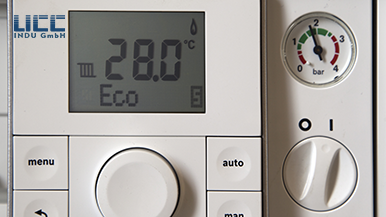 French
French
Temperature sensors
are indispensable components in modern industry and daily life. They are able
to convert temperature changes into measurable electrical signals, providing
accurate temperature data for a variety of devices and systems. This article will
introduce several common types of temperature sensors and their characteristics
to help you better understand this key technology.

Thermocouples
The thermocouple is one of the most common and widely used temperature sensors. It consists of two different metal wires connected together and works using the principle of the thermoelectric effect. Common types of thermocouples include Type K, Type J, and Type T.
Advantages:
- Wide measuring range (theoretical range -270°C to 1800°C, practical applications are usually narrower)
- Simple and robust construction
- Fast response time
- No external power supply required
Disadvantages:
- Small output signal, requires amplification
- Non-linear output, requires calibration
- Relatively low accuracy
Thermocouples are suitable for measurements in high temperature environments such as industrial furnaces and chemical reactors.
Resistance thermistor (RTD)
RTDs measure temperature by using the property that the resistance of a metal conductor changes with temperature. The most common are platinum resistors (e.g. Pt100, Pt1000), in addition to RTDs made of nickel and copper materials.
Advantages:
- High accuracy and stability
- Good linearity
- Wide measuring range (typical range -200°C to 850°C for standard platinum resistors, special designs up to -270°C to 1000°C)
Disadvantages:
- Slow response time
- Requires external excitation current
- Higher cost
RTDs are commonly used where high accuracy measurements are required, such as in food processing, pharmaceuticals and precision instrumentation.
Thermistor
Thermistors are semiconductor temperature sensors whose resistance changes with temperature. There are two types: positive temperature coefficient (PTC) and negative temperature coefficient (NTC). Advantages:
- High sensitivity
- Fast response
- Miniaturisation
- Low cost
Disadvantages:
- Non-linear output
- Relatively narrow measuring range (typical NTC range -55°C to 150°C, special models -100°C to 300°C)
- Poor long-term stability
Thermistors are commonly used in household appliances, automobiles and medical equipment.
Integrated Circuit (IC) Temperature Sensors
IC temperature sensors integrate temperature sensing and signal processing on a single chip. Common types include the LM35 and DS18B20.
Advantages:
- High accuracy
- Linear output
- Easy to use, no complex calibration required
- Digital outputs are available
Disadvantages:
- Limited measuring range (common range -55°C to 150°C, special models up to -200°C to 200°C)
- Requires a mains power supply
- Long response time
IC temperature sensors are widely used in consumer electronics, computers and industrial control systems.
Infrared Temperature Sensors
An infrared temperature sensor is a non-contact sensor that determines the temperature of an object by measuring the infrared radiation it emits.
Advantages:
- Non-contact measurement
- Fast response
- Can measure the temperature of moving objects or hazardous areas
Disadvantages:
- Accuracy is affected by environmental factors
- Higher cost
- Requires periodic calibration
Infrared temperature sensors are commonly used in industrial process control, building energy efficiency, medical diagnostics (e.g., fever detection) and industrial equipment monitoring.
Emerging Temperature Sensor Technologies
In addition to the traditional types of temperature sensors mentioned above, a number of emerging technologies are also being developed:
- Fibre optic temperature sensors: Distributed temperature measurement using the characteristics of fibre optics, suitable for long-distance, wide-range temperature monitoring.
- MEMS temperature sensors: microelectromechanical systems technology to create miniature temperature sensors, with small size, low power consumption.
Conclusion
Selecting the right temperature sensor requires consideration of several factors, such as measurement range, accuracy requirements, response speed, environmental conditions and cost. Understanding the characteristics and applicable scenarios of various types of temperature sensors can help you make the best choice in practical applications. Whether it is industrial production, scientific research or daily life, temperature sensors are quietly providing us with important temperature information, promoting the continuous progress of technology and quality of life.
Clause de non-responsabilité : Les informations fournies sur cette page le sont à titre informatif uniquement et nous ne garantissons pas l'exactitude ou l'exhaustivité de ces informations et n'acceptons aucune responsabilité pour toute perte ou tout dommage résultant de leur utilisation.
Ne manquez pas nos mises à jour d'informations sur les produits et nos offres spéciales. Saisissez votre adresse électronique, cliquez sur « s'abonner » et recevez un flux régulier d'inspiration et d'informations dans votre boîte aux lettres électronique. Nous nous engageons à respecter votre vie privée et à ne jamais envoyer de spam. Contactez-nous : votre soin à remplir le formulaire est récompensé par notre service enthousiaste !
2025-06-16
2025-06-10
2025-05-13
2025-05-09
2025-05-07
2025-04-29
2025-04-27
2025-04-23